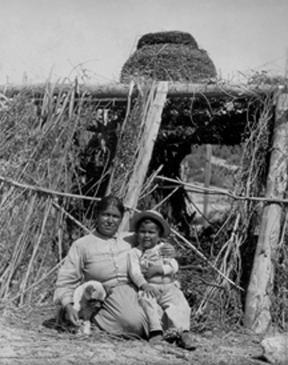May 6, 2016
By Emily Reynolds, Program Officer, Office of Library Services,IMLS
This is the fourth post in a four-part series highlighting recent awards made by the Office of Library Services in the National Digital Platform priority area, through the National Leadership Grants for Libraries program and the Laura Bush 21st Century Librarian program. To learn more about each project, click on their IMLS log number for links to components of their grant application.

Caption: Carolina Leto and son sitting under granary basket, San Ignacio, San Diego County, April 9, 1904. Photo was digitized and made web-accessible through a 2010 IMLS grant. Image courtesy of San Diego History Center.
Among the projects recently funded by the Office of Library Services are several that have the potential to increase access to, and engagement with, digital library collections. From creating digital library accessibility standards for blind and visually impaired users, to developing a strategy for integrating community archives in national collections, these projects will directly address users and content areas that are currently underrepresented in our national library infrastructure.
Diversity and inclusion were both key themes of the IMLS Focus: National Digital Platform convening we held last year, summarized in a report by OCLC. We were thrilled to receive several competitive proposals related to these issues, and hope that the funded projects will make important steps towards more inclusive services and collections for all users. The projects span both the National Leadership Grants for Libraries program (NLG) and the Laura Bush 21st Century Librarian program (LB21).
Increasing access to digital collections
Several recent recipients of NLG and LB21 grants proposed projects to increase access to digital infrastructure for a range of users. In the LB21 program, the University of Texas at Austin (RE-31-16-0014-16) received a $495,586 award to investigate and document best practices for library hotspot lending programs. By focusing on hotspot lending programs in Maine and Kansas, this project will delve into the role of the library in these communities, the opportunities provided by hotspot lending programs, broader community outcomes of increased connectivity, and operational data on how the programs are run. Libraries are often the sole sources of free internet access in rural communities, and increasing libraries’ capacity in this area will enable users with less connectivity to participate in our national digital infrastructure.
A $695,000 grant awarded to Minitex, a program at the University of Minnesota, (LG-70-16-0010-16) will build upon the existing open source SimplyE ebook app, the development of which was funded in part by previous IMLS funding (LG-05-13-0356-13, LG-00-15-0263-15). Minitex will expand the functionality of SimplyE to federate ebooks from public library collections with statewide, consortial, and national ebook collections. In partnership with the Massachusetts Library System and Reaching Across Illinois Library System, consortial versions of SimplyE will be deployed in Minnesota, Illinois, and Massachusetts. This will increase patron access to ebooks, including those provided through the Open Ebooks initiative, and broaden the ability of libraries to provide this access within a single interface.
While we work to broaden the geographic and institutional reach of national digital platform infrastructure, many users are still unable to effectively use these systems. University of Wisconsin-Milwaukee received a $495,600 grant (LG-70-16-0038-16) for a research project resulting in the creation of design guidelines for digital libraries on accessibility, usability, and utility for blind and visually impaired users. The project has a wide range of partners, from organizations maintaining digital libraries, to organizations serving the blind and visually impaired community, to scholars and experts in accessibility and usability. As IMLS continues to invest in expanding the reach of digital library infrastructure, it is absolutely vital that we ensure these resources are accessible to users with a wide range of needs.
Diversifying digital collections
In addition to increasing user access to digital library collections, participants at the IMLS Focus: National Digital Platform convening emphasized the need to more critically examine the communities that are and aren’t represented in our national digital collections. A $100,000 award to the Amistad Research Center (LG-73-16-0003-16) will fund a series of forums to discuss community archives’ integration in the national digital platform. These meetings will bring together community archives practitioners, community members, scholars, and digital collections leaders, with the goal of addressing the potential impact of increased representation of marginalized communities and people in our digital cultural heritage. These solutions-based conversations will be livestreamed, encouraging social media participation; a white paper will also be released to summarize the events and propose recommendations. This project is undertaken with partners including the Shorefront Legacy Center, the South Asian American Digital Archive, the Inland Empire Memories Project of UC Riverside, and Mukurtu.
In a similar vein, a $249,858 award to the Museum of New Mexico Foundation (LG-70-16-0047-16) will support the state of New Mexico’s Museum of Indian Arts and Culture, the New Mexico State Library Tribal Libraries Program, and the Indian Pueblo Cultural Center in developing tools for extending access to mass-digitized archival records. The project will include the development of extensions to Omeka-S, an open source content management system, to include: integration with the International Image Interoperability Format (IIIF), user tagging and annotation tools, and tools related to the management of culturally sensitive materials. The development of Omeka-S has been funded in part by a 2015 NLG award (LG-70-15-0258-15), so this is an exciting addition to that work.
In addition, the project will result in the development of a use case implementation of the software to provide access to digitized public records relating to Native land and American Indian boarding schools. The development of this digital collection will include community meetings with populations including New Mexico’s 23 tribes, training tribal librarians in the use of the software and providing fellowships for tribal members to participate in the development of the use case.
It is our hope that the work that comes out of these projects will empower and enable more libraries to engage directly with communities and collections that are underrepresented in our national digital collections.